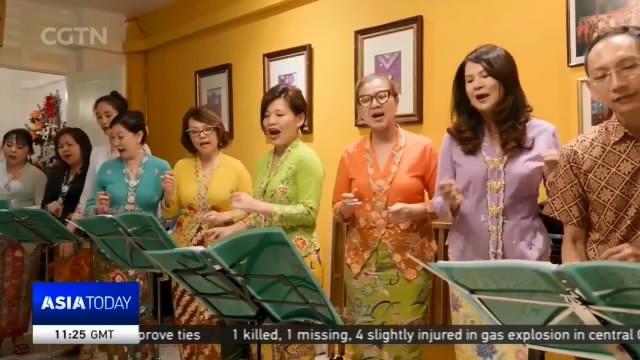
20:38, 02-Jan-2018
Peranakan Patois in Singapore: Creole language lives on in the performing arts

The Peranakan patois isn't widely spoken in Singapore, but a cultural association is keeping it alive through song and dance, as well as language classes and theater plays. In this segment of our Peranakan series, our correspondent Miro Lu visits the association to bring you the story.
Peranakan patois is a mix of Malay and Hokkien, created when traders from China's Fujian province married Straits-born Malays. It is a colourful language filled with songs, poetry and idioms. The language comes to life every week at the Gunong Sayang Association. Members of GSA are part of a small but passionate community who want to preserve the Peranakan language through performing arts. Audrey Tan finds her key with Malay musician. For sisters Jacqueline and Audrey Tan, who perform regularly in Peranakan, speaking the language is a way to understand their culture.
JACQUELINE TAN MEMBER, GUNONG SAYANG ASSOCIATION "It's a place to meet like-minded people, to do things related to the culture, related to the traditions. "
AUDREY TAN MEMBER, GUNONG SAYANG ASSOCIATION "To learn actually. To learn more, because there's so much more to the culture. Here you know now we are doing singing. I'm involved in drama. So we learn along the way. When we act with older cast, they use much deeper words that we've never heard, the old language. "
Jacqueline and Audrey grew up in the GSA. As teenagers, they watched their parents perform Peranakan song and dance, and wanted to continue being part of the culture. But that's not the case for many in their generation. Up till recently, the Peranakan patois was almost extinct in Singapore. Only about a thousand people could speak it fluently.
MIRO LU SINGAPORE "The GSA hopes to change that with Peranakan language classes launched earlier this year. During weekly classes, students young and old learn the language through topics such as salutations, traditional costumes and festivals."
FREDERICK SOH PERANAKAN LANGUAGE TEACHER & GSA VICE PRESIDENT "The root of the all cultures is the language. If you talk about the Chinese culture you have the language, the Malay culture the language. I think the Peranakan itself, it's important we know our roots, so that's where the language comes into the picture. "
The language classes are nothing like school here. Students and GSA members mingle over lively discussions, home-cooked food and even the Peranakan card game cherki. It's no wonder that the eight-week course has been fully subscribed since its launch.
DR. NALA LEE ASSOCIATE PROFESSOR OF LINGUISTICS NATIONAL UNIVERSITY OF SINGAPORE "Linguists have what we term the third-generational regret. Usually, in situations of language loss, it is the third generation that begins to regret the loss of language or culture. At a certain point in time, the descendants would usually have time to think about these things. A lot of them feel like they are bearing the brunt of language loss, and feel like the need to connect back to the culture. "
With the public's interest in Peranakan performing arts and students lining up to learn the language, the GSA is confident that the culture will continue to flourish. Miro Lu, CGTN, Singapore.

SITEMAP
Copyright © 2018 CGTN. Beijing ICP prepared NO.16065310-3
Copyright © 2018 CGTN. Beijing ICP prepared NO.16065310-3